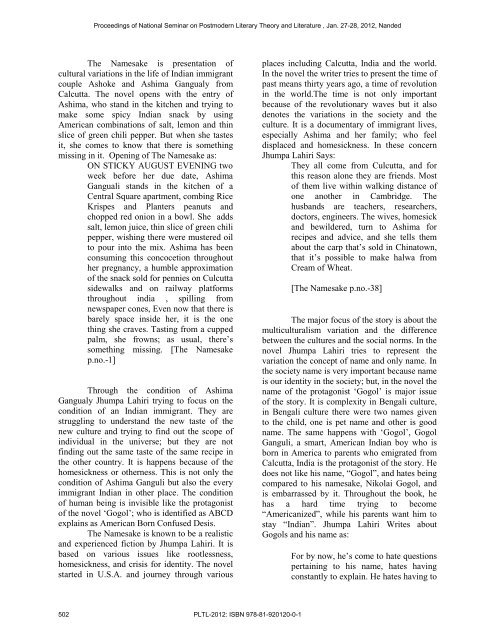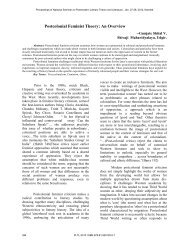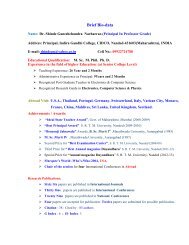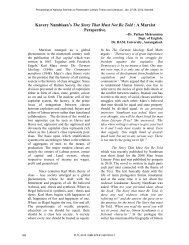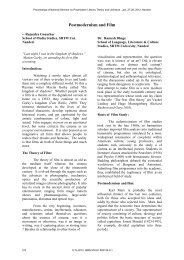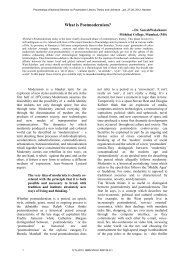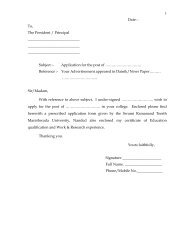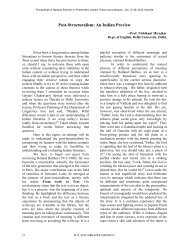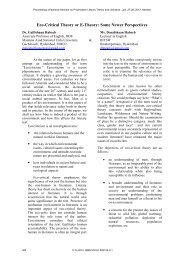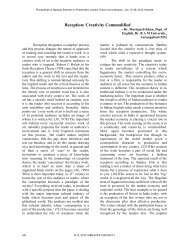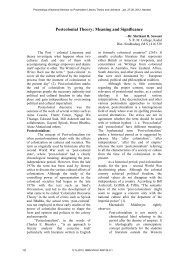Multiculturalism - Igcollege.org
Multiculturalism - Igcollege.org
Multiculturalism - Igcollege.org
Create successful ePaper yourself
Turn your PDF publications into a flip-book with our unique Google optimized e-Paper software.
Proceedings of National Seminar on Postmodern Literary Theory and Literature , Jan. 27-28, 2012, NandedThe Namesake is presentation ofcultural variations in the life of Indian immigrantcouple Ashoke and Ashima Gangualy fromCalcutta. The novel opens with the entry ofAshima, who stand in the kitchen and trying tomake some spicy Indian snack by usingAmerican combinations of salt, lemon and thinslice of green chili pepper. But when she tastesit, she comes to know that there is somethingmissing in it. Opening of The Namesake as:O N STICKY AUGUST EVENING twoweek before her due date, AshimaGanguali stands in the kitchen of aCentral Square apartment, combing RiceKrispes and Planters peanuts andchopped red onion in a bowl. She addssalt, lemon juice, thin slice of green chilipepper, wishing there were mustered oilto pour into the mix. Ashima has beenconsuming this concocetion throughouther pregnancy, a humble approximationof the snack sold for pennies on Culcuttasidewalks and on railway platformsthroughout india , spilling fromnewspaper cones, Even now that there isbarely space inside her, it is the onething she craves. Tasting from a cuppedpalm, she frowns; as usual, there’ssomething missing. [The Namesakep.no.-1]Through the condition of AshimaGangualy Jhumpa Lahiri trying to focus on thecondition of an Indian immigrant. They arestruggling to understand the new taste of thenew culture and trying to find out the scope ofindividual in the universe; but they are notfinding out the same taste of the same recipe inthe other country. It is happens because of thehomesickness or otherness. This is not only thecondition of Ashima Ganguli but also the everyimmigrant Indian in other place. The conditionof human being is invisible like the protagonistof the novel ‘Gogol’; who is identified as ABCDexplains as American Born Confused Desis.The Namesake is known to be a realisticand experienced fiction by Jhumpa Lahiri. It isbased on various issues like rootlessness,homesickness, and crisis for identity. The novelstarted in U.S.A. and journey through variousplaces including Calcutta, India and the world.In the novel the writer tries to present the time ofpast means thirty years ago, a time of revolutionin the world.The time is not only importantbecause of the revolutionary waves but it alsodenotes the variations in the society and theculture. It is a documentary of immigrant lives,especially Ashima and her family; who feeldisplaced and homesickness. In these concernJhumpa Lahiri Says:They all come from Culcutta, and forthis reason alone they are friends. Mostof them live within walking distance ofone another in Cambridge. Thehusbands are teachers, researchers,doctors, engineers. The wives, homesickand bewildered, turn to Ashima forrecipes and advice, and she tells themabout the carp that’s sold in Chinatown,that it’s possible to make halwa fromCream of Wheat.[The Namesake p.no.-38]The major focus of the story is about themulticulturalism variation and the differencebetween the cultures and the social norms. In thenovel Jhumpa Lahiri tries to represent thevariation the concept of name and only name. Inthe society name is very important because nameis our identity in the society; but, in the novel thename of the protagonist ‘Gogol’ is major issueof the story. It is complexity in Bengali culture,in Bengali culture there were two names givento the child, one is pet name and other is goodname. The same happens with ‘Gogol’, GogolGanguli, a smart, American Indian boy who isborn in America to parents who emigrated fromCalcutta, India is the protagonist of the story. Hedoes not like his name, “Gogol”, and hates beingcompared to his namesake, Nikolai Gogol, andis embarrassed by it. Throughout the book, hehas a hard time trying to become“Americanized”, while his parents want him tostay “Indian”. Jhumpa Lahiri Writes aboutGogols and his name as:For by now, he’s come to hate questionspertaining to his name, hates havingconstantly to explain. He hates having to502 PLTL-2012: ISBN 978-81-920120-0-1


